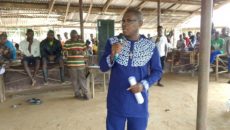MONROVIA, Montserrado – The Director of the Legislative Information Service at the Liberian Legislature, McCarthy Weh, has submitted a proposal to the leadership of the Liberian Senate and the House of Representatives seeking a comprehensive reform at the Liberian Legislature.
In a communication addressed to Speaker Alex Tyler and Sen. Armah Jallah, Weh said although the legislature has continued to fulfill its constitutional responsibilities, its internal operations have not been smooth.
“The need for legislative reforms that will commensurate with present day reality cannot be overstated,†he said. He stressed that there had been some reform efforts in other countries including with the Zambian parliament and the United States Congress that should serve as guidance to Liberia’s.
He said Zambia had identified 73 activities aimed to institute reform within its parliamentary procedures. Of that amount, the southern African country has already completed 83 percent. In comparison, he said the Liberian Legislative modernization program identified just 36 reform activities and had only completed 11 percent.
According to Weh, “This was due to the lack of budgetary support for work of its joint committee established to execute the implementation of the plan.â€
Weh also drew the attention of the Liberian Legislature to a 2013 publication entitled “A Brief History of Congressional Reform Efforts†by Donald R. Wolfensberger, indicating that “by the end of World War II, many legislators of the United States Congress had concluded that the only way to recapture their lost statures was to reform the Congress.â€
“The [Legislative Reorganization Act of 1946] is recorded as the most comprehensive reorganization of the U.S. Congress,†Weh said.
He said reorganizing the Liberian Legislature, as was done by the U.S. Congress in 1946 and 1970, would mean revisiting inherited measures that are no longer expedient, especially when constituents of the lawmakers want such operations removed.
Meanwhile, Weh has submitted a proposal for the drafting and passage of a Liberian Legislature Reorganization Act, which would develop and institutionalize a Liberian Legislature Development Program.
In addition to the proposal, he also proposed specific areas for Legislative reorganization.
Weh proposed the commissioning of periodic audits of the secretariats of the Legislature, at most twice a term – preferably at the middle and end of a given legislative term. “This would serve as a further guarantee that will usher in the next legislature on a platform of financial accountability,†he said. He said the Legislature could also sponsor a public debate on whether it needs to be audited, as some members hold the view that as a non-spending entity, the legislature should be exempted from audits.
For the purpose of efficacy, Weh called for self-control of the legislature’s budget and the introduction of detailed administrative and managerial budgetary provisions to support professional operations of the legislature. He disclosed the need for the establishment and strengthening of an internal audit departments with a semi-independent status backed by full technical, administrative and logistical supports.
In his proposal, Weh wants lawmakers to consent to declare their assets upon their election for credibility, accountability, and collective national transparency.
Also as part of the reform, he expressed the need for making the electronic voting system mandatory in both chambers. He said this would enhance the country’s parliamentary democratic credentials. This system, he said, will document the actions and votes of legislators and help in recording legislative history.
Weh also proposed that the lawmakers change the name of the committee of “Rules, Order, and Administration†to be called “Committee on Rule and Order†leaving the policymakers with national policy issues and internal administrative matters left with technicians for subsequent report to either chamber’s leadership through their respective committees.
In his 12-count proposal, Weh called for the initiation of staff training and professional development through “The Institute of Legislative Studies.†The institute would extract lessons from other parliaments intended to train current and future legislators and legislative staffs in parliamentary activities.
He further called the legislature to formulate measures that would standardize the income and benefits of Deputy and Assistant Ministers at the Executive and Secretary of the Senate, Chief Clerk, and Chief-of-Office Staff and Directors among others with the legislative branch.
At the same time, Weh proposed the creation of a Joint Services Committee. He said, “This committee will exert oversight over departments and services to and for both houses.â€
Weh said his proposals were in addition to ongoing modernization plan, out of which some gains have been made. Â He said the gains include the creation of the Legislative Budget Office and the establishment of the Legislative Information Service with support from USAID.
The leaderships of both chambers of the legislature are yet to comment on the proposals, but some ordinary citizens have expressed mixed views.
Korto Johnson, a teacher in Paynesville, thinks Liberia has had too many different policies but poor implementation. She said the policy was not a factor to Liberia’s problem, but rather the lack of effective implementation.
“I don’t think our problem over the years has been the lack of policies,†she said. â€We have policies on the book that can transform this country, but they are ignored.â€
She said the lawmakers do not respect the very laws that are legislated by them. This situation she said was a total disregard to reform and modernization.



